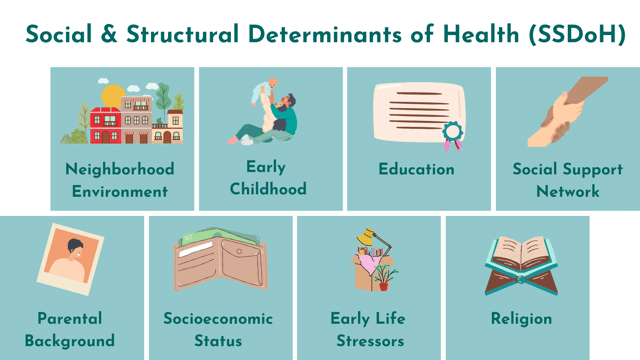By Sharnita Midgett
How do the things we’ve experienced in our past impact tomorrow? Social and structural determinants of health (SSDoH) are the conditions—such as where we live, play, worship, study, grow up, and age—which can impact health later in life.
PMC researchers Shana Stites, PsyD, MA, MS, Dawn Mechanic-Hamilton, PhD, ABPP/CN, Sharnita Midgett, MPH, and PMC Co-Directors David Wolk, MD, and Jason Karlawish, MD, and researchers at fellow Alzheimer Disease Research Centers (ADRCs) are studying how SSDoH impact our brain health as we age. In a recent paper published in the Gerontologist, the group proposed a framework for how dementia researchers could collect information about SSDoH from research participants.

SSDoH include factors like neighborhood environment, early childhood experiences, education, access to social support, parental background, socioeconomic status, early life stressors, and religion
It is known that events and conditions throughout one’s life, or over the life course, are related to changes in older adults’ brain health. Exposures over the life course can change a person’s risk for Alzheimer’s disease and related dementias (ADRD). For example, those who experience more life stressors may be at higher risk of developing dementia versus someone who experiences less stress.
This paper highlights ways that social and psychological factors impact brain health, and highlights the reasons why ADRC researchers should consider these factors when studying ADRD. This includes things that we are aware of, and the things that we may not think about: the things that happen around us.
“What people do – without even thinking – in their daily lives can impact their risk of dementia. We need to systematically study this in lots of different people who do lots of different things every day to discover what might be the most central factors to preventing or limiting dementia,” said Dr. Stites.
Members of our PMC community have worked with Penn researchers by dedicating their time to think about SSDoH and its impact on their lives and their brain health. They completed the Aging Brain Cohort (ABC) Life Experiences Survey—a survey created by Penn researchers that is being used to gather information about:
- one’s early life stressors
- education
- socioeconomic status
- parental background
- early childhood
- neighborhood environment
- social support networks
- religion
- demographics, among other life factors.
“Our lifelong experiences inform all stages of our development, from early childhood to older adulthood. In partnership with ABC participants, we hope to better understand how the full range of those experiences impact changes in thinking and risk for dementia as we age,” said Dr. Mechanic-Hamilton.
The survey helps us better understand the impact of lived experiences on brain health and dementia outcomes in our research cohort. The goal is that surveys like this will become standard among ADRCs across the nation.
The Aging Brain Cohort Life Experiences Survey is currently being distributed to participants in our Aging Brain Cohort (ABC) Study.